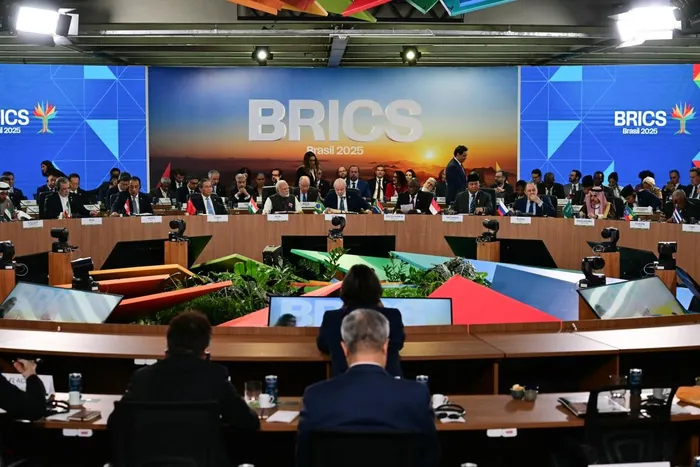From St. Petersburg to Soweto: A BRICS opportunity to modernise South Africa's water services

General view during a plenary session of the BRICS summit in Rio de Janeiro, Brazil.
Image: Pablo Porciuncula/ AFP
By Ayanda Holo, President of TV BRICS AFRICA
Just weeks after Deputy President Paul Mashatile stood before global investors at the St. Petersburg International Economic Forum and affirmed that "South Africa and Russia will significantly deepen trade relations as BRICS partners," the echoes of that commitment are already rippling through our economy, not as platitudes, but as pipelines of opportunity. From July 8 to 10, Johannesburg's Gallagher Convention Centre becomes the stage for a quiet revolution in South-South cooperation.
A powerful delegation of industrial innovators from St. Petersburg, Russia's gateway to the world, will participate in IFAT Africa 2025, the continent's most significant environmental technology exhibition. These firms bring with them more than technological marvels. They provide evidence that the BRICS economic narrative is not abstract, but actionable, visible, and mutually rewarding. At the heart of this participation lies an important, albeit underreported, diplomatic milestone: the sister-city relationship between St. Petersburg and Johannesburg, established in 2001.
This IFAT is more than symbolism; it is a commercial channel waiting to be scaled. The IFAT Africa exhibition is the channel in motion. St. Petersburg companies attending the event — including Vodokanal, TFBE, NAECO, and EXIMO — are global leaders in water purification, industrial wastewater treatment, and urban water system efficiency.
The presence of Vodokanal, which manages one of the largest water utilities in Europe, is especially noteworthy for municipalities across South Africa that are grappling with ageing infrastructure, load-shedding-related pump failures, and ballooning urban populations. South African enterprises, utilities, and government departments must view this moment not just as another exhibition, but as an open invitation to co-develop, co-finance, and co-own solutions for our most pressing environmental and economic challenges.
It is no secret that water is becoming one of the scarcest and most politicised resources in the 21st century. What is less often said is that water management is also one of the fastest-growing economic sectors, globally projected to exceed $1 trillion by 2030.
For South African businesses, especially in Gauteng, Limpopo, and the Eastern Cape, investing in this sector is not a side project; it is a national strategy. The IFAT Africa schedule reads like a masterclass in applied BRICS cooperation. At 12:30 on July 8, the official opening of the St. Petersburg stand (Hall 3, Stand B035) will set the tone. Minutes later, the "South Africa – Saint Petersburg Economic Cooperation Dialogue" roundtable will gather key stakeholders, including the Johannesburg Chamber of Commerce and Industry, Rand Water, the Water Research Commission, and Russia's Trade Mission.
And at 15:15, a cutting-edge panel will dissect new technologies in water treatment and sludge disposal, real solutions for real problems. But beyond the booths and name badges, the subtext is clear: Russia is not simply seeking to export products; it is looking to localise, partner, and innovate together with African counterparts. This model is the cornerstone of BRICS industrial policy, offering a direct contrast to the extractive models that historically defined trade between Africa and the West. Indeed, as South Africa eyes industrial diversification and seeks to build sustainable cities, now is the time for our CEOs, utility executives, and provincial heads to walk the talk. IFAT Africa should not be a passive exhibition tour. It should be a deal-making arena, a site of memorandum signings, pilot project launches, and matchmaking for public-private partnerships.
One cannot overstate the strategic advantage of South African firms partnering early with Russian counterparts. These companies bring not only robust technologies but also alternative financing mechanisms, state support, and experience working in extreme climates and complex regulatory environments, lessons that resonate with our own.
In 2024, South Africa hosted over 15 high-level BRICS meetings. But summits alone do not build infrastructure or create jobs. Events like IFAT are where the rubber meets the road, where the diplomacy of words becomes the diplomacy of deeds. Deputy President Mashatile's message from St. Petersburg was clear: BRICS is not a talking shop. It is a trading bloc. It is a knowledge alliance. It is a future-oriented ecosystem, and South Africa must lead from the front, not lag.
The opportunity is in IFAT at the Gallager Convention Centre, our backyard. Let us not wait for the next foreign investment conference to say what we could have signed today. Attend. Engage. Export. Innovate!
*The views expressed here are not necessarily those of IOL or of title sites
Related Topics: